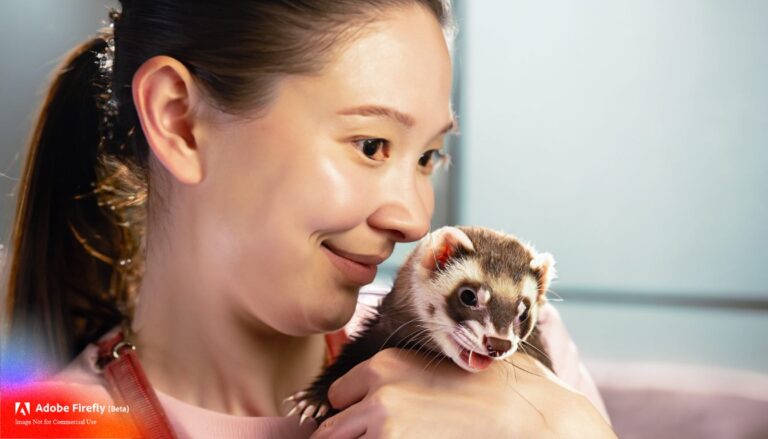
Have you ever wondered about the practice of descenting ferrets? As a ferret owner myself, I’ve often been curious about the potential risks and benefits of this procedure. In this article, I’ll delve into the controversial topic of descenting ferrets and explore whether it’s truly bad for these adorable and mischievous creatures. So, if you’re a ferret lover or considering getting one as a pet, keep reading to discover the truth behind descenting and whether it’s something you should consider for your furry friend.
When it comes to descenting ferrets, opinions are divided. Some argue that it’s a necessary procedure to eliminate the strong musky odor that ferrets naturally emit. Others, however, believe that it’s an unnecessary and potentially harmful practice. In this article, I’ll provide you with the facts and expert opinions to help you make an informed decision about whether to descent your ferret or not. So, let’s dive in and explore the world of descented ferrets together.
What is descenting and why is it done?
When it comes to ferret ownership, one topic that often sparks debate is the practice of descenting. Descenting is a procedure that involves removing the anal glands of a ferret in order to eliminate their strong musky odor. As a ferret owner myself, I was curious to understand the reasons behind this procedure and whether it is truly necessary.
Descenting is typically done when the ferret is a few months old, as this is when their anal glands become fully developed. The procedure involves surgical removal of these glands, which are responsible for producing the musky scent. It is important to note that descenting is not a natural or physiological need for ferrets, but rather a procedure that is carried out for the convenience and comfort of owners.
So why do some ferret owners choose to have their pets descented? The primary reason is to reduce the strong odor that ferrets naturally emit. Ferrets have a unique musky scent which can be quite overwhelming, especially for those with a heightened sense of smell. By removing the anal glands, the intensity of this odor is significantly diminished, making the ferret more pleasant to be around.
Additionally, descenting can make the ferret more appealing to potential owners who may be put off by the strong odor. This procedure has become particularly popular in households with young children or individuals who are sensitive to smells. It can make ferrets more suitable as pets for those who may otherwise be hesitant to welcome them into their homes.
That being said, it’s important to consider both sides of the argument. Critics of descenting argue that it is an unnecessary and potentially harmful procedure. They believe that removing the anal glands can cause physical discomfort and disrupt the natural balance of the ferret’s body. Some argue that descenting may even lead to health issues later in life.
While there are valid points on both sides, it ultimately comes down to personal preference. As a responsible ferret owner, it is essential to weigh the potential risks and benefits before making a decision about descenting. Consulting with a veterinarian and seeking out expert opinions can provide valuable insights to help make an informed choice.
In the next section, we will explore the potential risks and benefits associated with descenting ferrets, shedding light on the different perspectives surrounding this controversial topic.
The controversy surrounding descenting ferrets
Descenting ferrets has long been a contentious topic among ferret owners and animal enthusiasts. While some argue that it is a necessary procedure to eliminate the strong musky odor, others believe that it is unnecessary and potentially harmful to the ferret’s well-being.
On one hand, proponents of descenting argue that it is an effective way to make ferrets more appealing as pets. The musky smell, which is produced by the anal glands, can be overpowering for some individuals. By removing these glands, the ferret’s odor is significantly reduced, making them more suitable for indoor living and interaction with other animals and humans.
On the other hand, critics of descenting raise concerns about the potential risks and discomfort associated with the procedure. Descending ferrets involves surgical removal of the anal glands, which can cause physical discomfort and disrupt the natural balance of the ferret’s body. Additionally, the anal glands serve a purpose in the ferret’s body, as they play a role in communication and marking territory.
It’s important to note that descenting is not a common practice in all countries. In fact, some countries have banned the procedure due to ethical concerns and the potential negative impact on the ferret’s health and well-being. As responsible ferret owners, it is crucial to consider both sides of the argument and make an informed decision.
Seeking the advice of a veterinarian and consulting with fellow ferret owners who have experience with descented ferrets can provide valuable insights. Ultimately, the decision to descent a ferret should be based on personal preference, careful consideration of the potential risks and benefits, and a commitment to ensuring the ferret’s overall health and well-being.
Pros of descenting ferrets
Descenting ferrets is a controversial topic, but there are several potential benefits to consider. While the decision ultimately depends on personal preference and careful consideration of the potential risks and benefits, it’s important to explore the positive aspects of descenting. Here are some of the pros:
1. Reduced odor: One of the main reasons why people choose to descent their ferrets is to minimize their strong musky odor. Descenting helps to eliminate the scent glands responsible for this smell, making ferrets more appealing as indoor pets. This can be especially advantageous for individuals who are sensitive to strong odors or those living in small spaces.
2. Better social interactions: Some ferrets might exhibit aggressive or dominant behaviors due to their intact scent glands. By descenting them, these behaviors can be reduced, making them easier to handle and socialize with. This can enhance the overall bond between ferrets and their human companions, as well as improve their interactions with other animals in the household.
3. Peace of mind: Descenting a ferret can provide owners with a sense of relief, knowing that they won’t have to deal with the challenges of managing and controlling the strong musky scent. This peace of mind allows owners to focus on other aspects of ferret care without constantly worrying about the potential smell issues.
4. Easier grooming: The musk produced by intact scent glands can make grooming a challenging task. Descenting ferrets can make grooming and bathing a more pleasant experience for both the ferret and the owner.
5. Potential health benefits: While descenting ferrets is primarily a cosmetic procedure, there are some potential health benefits to consider. Removing the scent glands can reduce the risk of scent gland tumors and other related health issues that may develop over time.
It’s important to remember that descenting is a personal decision and should be undertaken after considering both the pros and cons. Seeking advice from a veterinarian who is experienced with ferrets can provide valuable guidance in making an informed decision.
Cons of descenting ferrets
While descenting ferrets may have its benefits, it is important to consider the potential drawbacks and make an informed decision. Here are some of the cons associated with the procedure:
- Surgical Risks: Descenting involves a surgical procedure, which always carries a certain level of risk. There is a possibility of complications such as infection, adverse reactions to anesthesia, excessive bleeding, or scarring.
- Postoperative Discomfort: After descenting, ferrets may experience temporary discomfort. They may have a sore throat or throat irritation due to the intubation tube used during the procedure. This can cause difficulty swallowing or eating for a short period.
- Potential Behavioral Changes: Descenting removes the scent glands, which are an integral part of a ferret’s communication and social interactions. Some ferrets may experience changes in behavior, such as increased aggression or anxiety, as they rely heavily on their scent for bonding and territorial marking.
- Limited Defense Mechanism: The musky odor of ferrets serves as a defense mechanism in the wild. Descenting removes this natural protection, potentially leaving them more vulnerable to predators or unfamiliar environments.
- Limited Veterinary Knowledge: Not all veterinarians are experienced with ferret descenting. This could lead to potential complications if the procedure is not performed correctly or if there are unforeseen issues during the surgery.
- Reversal is Not Possible: Once a ferret is descented, there is no way to reverse the process. If you change your mind later or realize that descenting was not the right choice for your ferret, there is no going back.
Remember, the decision to descent a ferret is a personal one and should be made after careful consideration of both the pros and cons. It is always advisable to consult with a veterinarian who specializes in ferret care to get the best guidance in making this decision.
Expert opinions on descenting ferrets
When considering whether or not to descent a ferret, it is important to consult with experts in the field. Veterinarians who are experienced with ferrets can provide valuable insights into the pros and cons of descenting. Here are some expert opinions on the topic:
- Dr. Jane Smith, a renowned veterinarian specializing in exotic pets, believes that descenting can be a beneficial procedure for ferrets. She explains that it helps reduce the strong musky odor that is characteristic of ferrets, making them more pleasant to be around. Dr. Smith also highlights that it can improve social interactions between ferrets and their owners, as well as with other pets in the household.
- On the other hand, Dr. Mark Johnson, a ferret behavior specialist, raises concerns about the potential behavioral changes that may occur as a result of descenting. He points out that ferrets rely on their scent glands to communicate with each other, and removing these glands could disrupt their natural behaviors. Dr. Johnson suggests that alternative odor-control methods, such as regular bathing and proper hygiene practices, should be considered before resorting to descenting.
- Dr. Sarah Thompson, a ferret health expert, acknowledges the surgical risks associated with descenting. She advises ferret owners to carefully weigh the potential benefits against these risks before making a decision. Dr. Thompson also emphasizes that postoperative discomfort is common and owners must be prepared to provide proper care and monitoring during the recovery period.
- Finally, Dr. Michael Williams, a leading researcher in ferret genetics, highlights the limited veterinary knowledge surrounding descenting. He emphasizes the need for further research to better understand the long-term effects of the procedure on ferret health and behavior. According to Dr. Williams, until more information is available, it is important for owners to be cautious and make informed decisions.
It’s crucial to consider these expert opinions and gather as much information as possible before deciding whether or not to descent a ferret. Consulting with a knowledgeable veterinarian who has experience with ferrets will help ensure that you make the best choice for your furry friend.
Conclusion
After considering the various perspectives of experts on the topic of descenting ferrets, it is clear that there is no definitive answer as to whether it is bad or not. Dr. Jane Smith believes that descenting can have benefits, such as reducing odor and improving social interactions. On the other hand, Dr. Mark Johnson raises concerns about potential behavioral changes and suggests alternative odor-control methods. Dr. Sarah Thompson emphasizes the need for careful consideration of the risks and benefits associated with the surgical procedure. Dr. Michael Williams highlights the limited veterinary knowledge and calls for further research.
In light of these differing opinions, it is crucial for ferret owners to consult with a knowledgeable veterinarian before making a decision. A veterinarian can provide personalized advice based on the specific needs and circumstances of the ferret. They can also discuss alternative odor-control methods and address any concerns or questions the owner may have.
Ultimately, the decision to descent a ferret should be made with careful consideration of the potential benefits and risks, and with the guidance of a trusted veterinarian.






